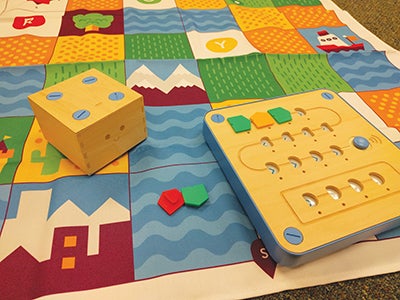Learn about STEM at the library
Published 12:00 am Sunday, March 25, 2018

- Children and families can meet Cubetto, a wooden robot that requires no special device or screen technology to code, on April 7 at the East Branch Library in Rockwell. Submitted photo
By Jennifer Nicholson
Rowan Public Library
Most of us have heard of the acronym STEM, from teachers, leaders in education, scientists, to even presidents of the United States. But what does that really mean?
STEM stands for Science, Technology, Engineering, and Mathematics; another acronym that is sometimes used alternately is STEAM, which includes Art. But what does this really mean, and why is STEM or STEAM so important?
In March 2015, then-President Barack Obama said, “(Science) is more than a school subject, or the periodic table, or the properties of waves. It is an approach to the world, a critical way to understand and explore and engage with the world, and then have the capacity to change that world….”
STEM is not just studying these set subjects, but rather a different way of thinking.
The U.S. Department of Education stated it best as, “In a world that’s becoming increasingly complex, where success is driven not only by what you know, but by what you can do with what you know, it’s more important than ever for our youth to be equipped with the knowledge and skills to solve tough problems, gather and evaluate evidence, and make sense of information.”
STEM education is about critical thinking, observation, and creativity.
Projections done by the U.S. Bureau of Labor Statistics for 2010-2020 predicts employment in STEM-related fields to grow by 18.7 percent, while other career fields are predicted by 14.3 percent. That means STEM is becoming the future — thus, the reason for the U.S. Department of Education to create new initiatives to help recruit more teachers focused on STEM and improving STEM education in preschools and in elementary schools to help better prepare our children for the future.
However, this initiative is being seen not only in schools and preschools, but also in after-school care, extracurricular activities, and also within public libraries.
The Rowan Public Library has been making great strives this year in creating programs and finding resources that are STEM-focused. RPL has also received several grants this year — including one with the partnership of Catawba College Teacher Education Department — that have helped create and boost our makerspace, or “The Coop,” to include Makey-Makeys, Raspberry Pi, and a green screen for film making, to name just a few items.
Another grant given to RPL from the Association for Library Service to Children (ALSC) has allowed the library to buy several robots to help boost STEM and coding programing, for children as young as 4 years old and up to 11 years old.
RPL has hosted and will continue to host several events in which families and children can come, meet and play with robots.
• Preschool robotics: RPL will host a preschool robotics program on Saturday, April 7, at 11 a.m. at the East Branch, Rockwell location. Children and families can come and meet Cubetto, a wooden robot, that requires no special device or screen technology to code. Come join Cubetto has he goes on specialize adventures, with his own storybook and map.
• Star Party: RPL also this year has received the Star Party kit part of the 2018 N.C. Science Festival, which is supported from the N.C. Space Grant and produced by UNC’s Morehead Planetarium and Science Center. RPL is one of 37 sites to receive this kit. This is the first year that the N.C. Science Festival has included public libraries; RPL one of six public libraries in the state to receive this kit.
RPL will be hosting the Star Party and celebrating everything space related on Friday, April 20, from 7:30 to 10:30 p.m., at South Rowan Regional Library, China Grove. For information or to find more science theme activities in North Carolina, please check out the N.C. Science Festival website at: https://www.ncsciencefestival.org/ or RPL’s website at www.rowanpubliclibrary.org.
• Robots and Legos: Want to play with more robots? What happens when robots meet Legos? RPL will host a STEAM into Adventure: Robots and Legos event on Saturday, April 28, at 11 a.m. Children 5-11 years old and families can come and play with Lego WeDo 2.0, Dash and Cubelets, and see what happens if you mix them, How well can robots and Legos get along?
For more information on upcoming STEM programs and other programs, go to www.rowanpubliclibrary.org.



